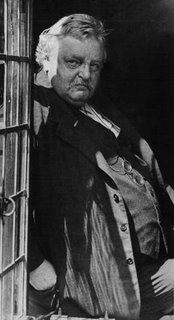 I'm a huge fan of G.K. Chesterton and am currently reading a fantastic book by him. The Man Who Was Thursday is arguably Chesterton's most popular novel. The book has been called a metaphysical thriller, but its brisk pace, lively dialogue and wry humor are rich with philosophical density. According to Wikipedia, the author
I'm a huge fan of G.K. Chesterton and am currently reading a fantastic book by him. The Man Who Was Thursday is arguably Chesterton's most popular novel. The book has been called a metaphysical thriller, but its brisk pace, lively dialogue and wry humor are rich with philosophical density. According to Wikipedia, the authorsuffered from depression for much of his life, and claimed afterwards that he wrote this book as an unusual affirmation that goodness and right were at the heart of every aspect of the world. He had hoped the book would serve as an encouragement to himself and to other members of his family who also had the tendency to become melancholy.
As I'm given to (what Spurgeon called) "fainting fits" and bouts with melancholy, I can attest to a strange buoyancy I derive from Chesterton's work.
Anyway, I recently purchased a used, nicely aged, hardcover copy of the book and have become immersed. But while doing a little research on the novel, I was surprised to discover an intersection of authors.
Last year, I read Neil Gaiman's terrific short story, A Study in Emerald (which you can read in PDF here). The story went on to win the Hugo and, being it was my first encounter with Gaiman, sent me in search of his other stuff. And there's lots of it. I purchased some of the The Sandman comic series and then American Gods. The novel explores the clash between gods of the old and the “new gods of credit card and freeway, of Internet and telephone, of radio and hospital  and television, gods of plastic and of beeper and of neon,” and how Americans have transferred their devotion from spiritual to material and technological gods.
and television, gods of plastic and of beeper and of neon,” and how Americans have transferred their devotion from spiritual to material and technological gods.
Gaiman has written for film and theater, collaborated on children's books and graphic novels, and has become something of a cult superstar. But what surprised me most about him, was the "religious" influences in his early life.
I learned of it first while scanning Wikipedia's bio of Chesterton. As expected, the prolific English author has influenced many through the years. Chesterton's writings have been praised by such authors as Ernest Hemingway, Graham Greene, Evelyn Waugh, Gabriel García Márquez, Dorothy L. Sayers, Agatha Christie, W. H. Auden, Orson Welles and Franz Kafka. C. S. Lewis, T.S. Eliot and Ingmar Bergman also drew inspiration from him. There is even a computer game, Deus Ex, which features excerpts from The Man Who Was Thursday and the British heavy metal band Iron Maiden uses an excerpt from one of his hymns as the first verse in their song Revelations. Chesterton? Iron Maiden? Go figger.
Enter Gaiman. According to the cyber-pedia:
The author Neil Gaiman has stated that The Napoleon of Notting Hill (an early Chesterton novel) was an important influence on his own book Neverwhere. Gaiman also based the character Gilbert, from the comic book The Sandman, on Chesterton. Gaiman's novel Good Omens, co-authored with Terry Pratchett is dedicated "to the memory of G.K. Chesterton: A man who knew what was going on."
As a child and a teenager, Gaiman grew up reading the works of C.S. Lewis and J.R.R. Tolkien along with Chesterton.
Although Gaiman is Jewish, he attended several Church of England schools. There he studied, among other things, religion. The training gave him a wide background in both Jewish and Christian theology/apocrypha, which he apparently incorporates into his works.
I find these author intersections fascinating and, learning of the Chesterton/Gaiman connection, has only piqued my interest. Perhaps the most obvious question is, How did these early Christian influences shape Gaiman's thinking? It does not appear Neil Gaiman has a unique interest in Christianity (other than the imagery it affords his writing). In fact, it's been reported Gaiman is the son of a prominent leader of the Church of Scientology. While I'm unaware of Gaiman's stated allegiance to Scientology, his proximity to so many differnet religions could explain a lot about his multi-faceted views. It is heartening, I guess, that he and G.K. have crossed paths. But if, as Gaiman suggests, Chesterton was "A man who knew what was going on," I wonder where that places Gaiman.

7 comments:
I love Chesterton, and ESPECIALLY "The Man Who Was Thursday." Utterly delightful, and it will leave you scratching your head for hours after every reading.
I've always been leery of Gaiman, however. Perhaps I'm guilty of lumping him in too much with the other British comic book writers who tend to be very ANTI-Christian.
I hear you about Gaiman, Tim. I read him to stay up on the genre, but also find his stories and characters unique. While I don't find him overtly anti-christian, he's definitely not a proponent of the faith. The story I mentioned in my post, A Study in Emerald, is a fascinating re-imagining of world history and horror literature. Seeing how influential and respected Gaiman has become, it's all the more intriguing that he praises Chesterton.
Well, I've mentioned a couple of times my girly crush on Mr. G. :)
I loved Neverwhere and the Sandman books, and I always have fun with his short stories. I read a recent one in one of the "Best of" fantasy anthologies: SUNBIRD, with an interesting use of the Phoenix legend.
I remember the G.K. reference in Sandman (I have all the Sandman bound volumes), but I never read any of G.K.'s fiction, so I wasn't aware of the influence on NEVERWHERE.
I did think it was very gentlemanly of Gaiman to excuse himself from the Hugo ballot (for Anansi Boys), since he thinks he's won enough and other names should be recognized. Tres classy.
Christians would bridle, no doubt, at his story riffing off Narnia--The Trouble With Susan--cause he has Aslan having sex with the Witch. Um...yeah...not an image my brain wants to dwell on. I am still not even sure if I understood that story.
Mir
I haven't read this book, but sounds like I need to. Wry humor? Come to mama! Thanks Mike. I always love to find out what great minds are reading and follow suit.
Writers are melancholy? Huh. ; )
What I love about Neil Gaiman's Sandman stories are the effortless collisions of high and low art, of pop culture and literature, of the physical and the temporal and the spiritual. You literally cannot guess where a story is going.
While his stories are certainly not "Christian," they take place inside of Creation. Which, of course, means that God is bigger than the bogeyman ...
As always, thought provoking and informative.
I see why you like A Study in Emerald. Reminded me a bit of your Faith in Fiction entry.
Post a Comment